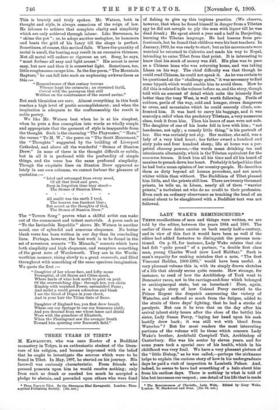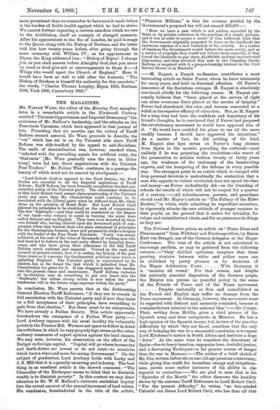LADY WAKE'S REMINISCENCES.*
Minn recollections of men and things were written, we are told by the editor, between the years 1864 and 1838. The earlier of these dates carries us back nearly half-a-century, and in view of this fact it would have been as well if the editor had added footnotes to distinguish the persons men- tioned. On p. 91, for instance, Lady Wake relates that she had felt "quite proud" of a partner, "a double first class man, young Charles Wood (now Lord Halifax)." Such is man's capacity for making mistakes that a note, "The first Viscount Halifax, 1800-1885," would have been useful. A very pleasant volume this is, with its simply drawn sketches of a life that already seems quite remote. How strange, for instance, to read of how the Archbishop of York went to Doncaster races, not in the carriage-and-four which belonged to archiepiscopal state, but on horseback ! Here, again, is a tragic story of how Colonel Percy carried to the Prince Regent the despatch announcing the victory of Waterloo, and suffered so much from the fatigue, added to the strain of three days' fighting, that he had a stroke of paralysis. But can it be true that on the day after his arrival (about sixty hours after the close of the battle) his sister, Lady Susan Percy, "laying her hand upon his sash hastily drew back ; it was still wet with blood from Waterloo " ? But for most readers the most interesting portions of the volume will be those which concern Lady Wake's brother, Archibald Campbell Tait, Archbishop of Canterbury. She was his senior by eleven years, and for some years took a special care of his health, which in his childhood was very frail. We have a very pleasant picture of the "little Bishop," as he was called,—perhaps the nickname helps to explain the curious story of how in his undergraduate days he paid a visit of inspection to Lambeth Palace. And, indeed, he seems to have had something of a halo about him from his earliest days. There is nothing in what is told of him but increases our respect ; one detail of his life that is made • The Reminiscences of Charlotte, Lady Wake. Edited by Luoy Wake. London: W. Blackwood and Sons. []2s. 6d. net.]
more prominent than we remember to have seen it made before is the burden of feeble health against which he had to strive. We cannot forbear repeating a curious anecdote which we owe to the Archbishop, itself an example of changed manners. After his appointment to the See of London, he paid homage to the Queen along with the Bishop of Durham, and the latter told him how twenty years before, after going through the same ceremony with William IV., on his appointment to Ripon, the King addressed him : "Bishop of Ripen! I charge you, as you shall answer before Almighty God, that you never by word or deed give aid or encouragement to those d—d Whigs who would upset the Church of England." Here it would have been as well to add after the footnote, "The Bishop of Durham is himself the authority for this anecdote," the words, "Charles Thomas Longley, Ripon 1836, Durham 1856, York 1860, Canterbury 1862."































































 Previous page
Previous page